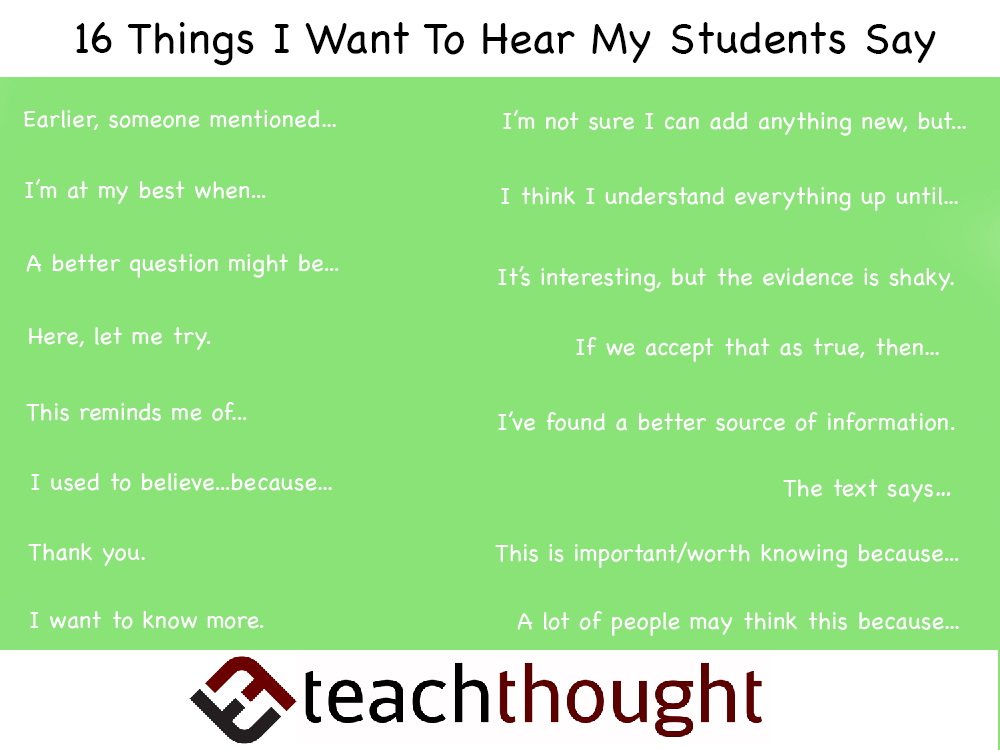
I Want To Hear My Students Say These Things
by Terry Heick
“Ohhh, now I get it.”
The iconic phrase that teachers value hearing. A sign that you’ve moved a student from not understanding to understanding. Into the light.
A lot is implied in this phrase, not the least of which is your own feel-good success–a warm indicator that you’re being an effective teacher, and that the next generation isn’t doomed after all. Notice the phrase doesn’t say “I get it.” It says “…now I get it,” as if they didn’t a few moments ago, but do now.
And the “Ohhh” even adds an immediacy to it all, as if the light just clicked on–right there at that moment under your sage and effortlessly influential guidance.
But for me, I want to something different. I want to hear and see students grappling with uncertainty–growing both intellectual and emotional muscle. Smarts and self-efficacy. Knowledge and perseverance.
Answers and questions.
The magic of learning isn’t in its finite and concrete inputs and outputs, but rather its abstractions–the confrontation between a thinker and the stimulus around them. This suggests that we look for something other than correct answers–little light bulbs coming on–to soothe us as educators.
We can even continue to think of them as light bulbs, but of a different shape and nature. Signs that the student is beginning to face themselves as a thinker. Some of these may sound a bit academic and unnatural–substitute whatever vernacular that fit in your content area, grade level, etc.
Share in the comments what you love to hear in your classroom, along with your grade level and content. We can see if there are any patterns. ; ^ )
You can also find some of these (and more) in one of our teaching materials–this one in card form.
16 Things Teachers Want To Hear Students Say
1. It’s interesting, but the evidence is shaky.
Be still my heart! Separating an appealing form from irrational structure! Superficiality from substance!
2. The text says…
You, young Einstein, are on your way to great things. You make it a habit of returning to the text rather than searching your mind for subjective opinions and half-truths. You skim the text instead of surveying an empty brain that doesn’t remember or did not understand the text the first time.
3. I used to believe…
Becoming aware of the transitions in your own thinking. Standing on your own shoulders as you climb towards enlightenment!
4. This reminds me of…
This one isn’t earth-shattering, but it’s among the most authentic responses a student can have to something. Rather than searching for an answer to a question (that you probably came up with), they’re instead trying to assimilate this new thing into what they already know, and are willing to share that process out loud.
5. I understand everything up until *this* point.
This is so, so, so much better than “I don’t get it,” or “I don’t know.” It is seldom that a student will flat out not understand a single thing about a problem, text, experiment, or related educational artifact. But they sure act like it sometimes–which is why a student surveying their own knowledge, and then identifying exactly where they got lost is special.
6. I’ve found a better source of information.
Judgment and evaluation–among the highest levels of thinking! And then the fact that they’re actively looking for sources themselves, and comparing them to existing sources! My teacher heart swells with pride!
7. A better question would be…
Yes. Yes. Yes. Yes. Yes. Yes. Yes. A thousand times, yes.
8. I want to know more.
And I can help you!
9. The author loses control of their argument here…
Okay, you may not hear this one often, but if you do give the kid a lollipop. Either you, their parents, or some astronomical happenstance has yielded a special little thinker here.
10. I’m not sure I know enough to add anything new, but…
Self-awareness and humility combined with a willingness to contribute!
11. If we accept that as true, then…
Critical analysis yielding takeaways that are then seamlessly transferred by the student. What else could you ask for?
12. Here, let me try.
A student recognizing rules, needs, or patterns, and then leaping way, way past merely being ‘engaged’ to actually give something a shot. And the diction implies uncertainty (try)–the student is willing to push through uncertainty to make an attempt rather than sitting listless and confused.
13. Thank you
Not because they owe you anything, but because humility and gratitude are at the core of wisdom and we all need one another.
14. This is important/worth knowing because…
Understanding what’s worth knowing is more important than knowing what’s worth knowing.
15. I’m at my best when…
All so much better than “Ohhh, now I get it.” The next step? Consistently designing learning experiences so that you hear these kinds of responses.
16. A lot of people might believe this because…
Understanding the source and nature of beliefs and thinking–a kind of ‘intellectual empathy.’

